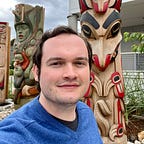A Short Review of “Alaska: An American Colony,” by Stephen Haycox
A Valuable, But Limited View on Alaska’s History and Culture
Alaska: An American Colony is one of those books that nearly every lover of Alaska history has seen or heard of, even if they haven’t actually read it.
I had been planning to read Stephen Haycox’s book for years, and now that I finally have, I’m very glad I did. Alaska: An American Colony makes some strong and insightful points about Alaska, and fills in the blanks on some parts of Alaska history that I had never learned before.
Unlike Ted Hinckley’s book The Canoe Rocks, which I also read and reviewed recently, Stephen Haycox successfully avoids the pitfall of writing a book that is overly encyclopedic and too focused on historical details to leave room for adequate argumentation. Haycox has written a thorough history of Alaska, to be sure, but Alaska: An American Colony is not filled with every interesting or entertaining story from Alaskaʼs past that he could have possibly included. In fact, when some stories from Alaska history I know to be quite interesting are mentioned, they are often summarized very neatly, and Haycox includes them only as much as he needs to in order to support his bookʼs narrative.
That narrative is crystal clear: Haycox argues that Alaska has been a colony for the past 250 years, throughout the entirety of its Russian and American histories. He supports this by repeatedly demonstrating that the Russian and American inhabitants of Alaska remained dependent on outside resources to support their lives; that they imported cultural patterns from elsewhere rather than developing their own unique culture in Alaska; and that most or perhaps all of the key decisions regarding the use of Alaskaʼs land and resources have been made outside of Alaska, most of them without significant input from its inhabitants.
Nevertheless, Alaska: An American Colony seems to me to be a book of contradictions. First of all, while Haycox is laser-focused on demonstrating that Alaska has been and continues to be a colony, he does not stop to question his own narrow definition of what a colony actually is. Can a colony truly be defined by dependence on outside resources? I believe many colonies in history largely subsisted on their own resources while being controlled and exploited by an outside power. To my mind, a colony should be defined less by economic and cultural dependence, which is what Haycox emphasizes, and more by political control and economic exploitation.
Second, while I do consider Haycox to be effective in supporting his key arguments, (according to his definitions), there are some elements of those arguments that, upon further consideration, would seem to contradict each other or have some questionable implications. To take one example, Haycox argues very strongly that the history of the American settlement of Alaska fully aligns with the history of the American West as a whole. In effect, he rejects any sort of “Alaskan exceptionalism” when it comes to Alaska’s history as part of the United States. However, if the ultimate conclusion of Alaska: An American Colony is that Alaska is… an American colony, (because of Alaskans’ dependence on the rest of the country, the decision-making power of the federal government, and so on), does that mean other western states are also colonies? Would Haycox say that Idaho is an American colony? Nevada? Utah? The definition of “colony” seems to have stretched pretty far if it includes a fair number of sovereign states within the United States.
Lastly, Haycox claims that Alaska Natives play a central role in his book, and some readers might believe he does so successfully: Indigenous people were, of course, critical to many of the key moments in Alaska history that Haycox addresses. However, regardless of their involvement in major stories told in the book, Alaska Natives are ultimately pretty irrelevant to Haycox’s thesis about Alaska’s nature as a colony. Although Haycox does address the history of cultural assimilation and its impacts on Alaska Natives to some extent, highlighting or analyzing Indigenous peoplesʼ experiences with colonialism is not a priority for him.
In short, Alaska: An American Colony is a book that convincingly shows that Alaska has been a colony—at least by one definition—throughout much of its history. In doing so, however, it raises more questions than it answers about Alaskans’ experiences of colonialism and the nature of colonialism itself. I eagerly look forward to seeing more Alaska historians and social scientists explore this issue in greater depth. In the meantime, Professor Haycox provides us with valuable scholarship to reflect on.
Please leave a comment below if you have thoughts, reactions, or questions. Have you read Alaska: An American Colony, or do you plan to? Let me know!
